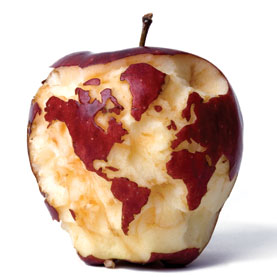On my way to work this morning, after dropping Mache off because she insists on listening to First Wave – thank god for XM Radio – I heard a story on American farming and how they “feed the world”.
If you weren’t listening to NPR at the same time as me it can be found here.
Suffice to say, the discussion is about feeding the world’s hungry and how American farmers produce, and more importantly CAN produce, so much food that they should be feeding the world. That’s quite the statement – I’d even call it admirable. Produce enough grain and soy and vegitables to feed the world and get rid of hunger. Strike out starvation. Save the cheerleader – sorry, wrong topic.
Yet, hearing the arguments troubled me. I’m not against saving the world from starvation, just like I’m not against saving the world from tyranny (I’m cool with Tyrion, just not tyranny). However, should farming in American soil be the solution? There are two things that come to mind when I listened to this story
- Should we solve their problem by making the starving (especially those outside the United States) dependant on us?
- Isn’t locally grown food more healthy for you?
So I did some quick research this morning – I know, I’m a learned man. First of all, this quote is NOT from the bible; I was sure it was:
If you give a man a fish you feed him for a day. If you teach a man to fish you feed him for a lifetime.
–Lao Tzu, the Chinese founder of Taoism, 4th Century BC
Shouldn’t we be finding ways to get farming into the hands of the starving? I don’t mean on day 1 we drop seeds and an Ikea-like instruction guide, but let’s make feeding onself possible in countries like Haiti, Uganda, the Congo by providing the equipment and the education to get things started and then come back to provide additional training and answer questions. Don’t feed them, help them feed themselves.
As for the health benefits of local food – it makes sense, doesn’t it? If grapes pull nutrients and flavors from the soil they are grown in to inform the flavor profile of a bottle of wine and if local honey helps build the immune system against local alergents, shouldn’t it be healthier to eat local food rather than food grown in a different continent?
University of North Carolina at Chapel Hill thinks so. In 2008 they received a grant to study the public health impact of moving toward a local, sustainable food system. Since then they’ve performed research in 19 countries and identified 7 case studies looking at exactly that. It’s too early to say for sure, but if we can, WHY NOT?
You’ll note I haven’t started talking about environmental impact – but the research is out there.
Suffice to say, I’m not against American farmers or even American Farming. I know there is research out there trying to answer world hunger. I know there are organizations out there providing local food supplies and training people to feed themselves. Let’s help them – let’s take the research grants for GMO and pestisides for farming in the United States and change gears to focus on the hardest hit areas of the world.
I know – we’re a capitalist society. We’re out to make money. We want our business to grow – and I’m cool with that. Let’s just make sure our business is what SHOULD be growing.
Photo Credit: Scientific American – Kevin Van Aelst



